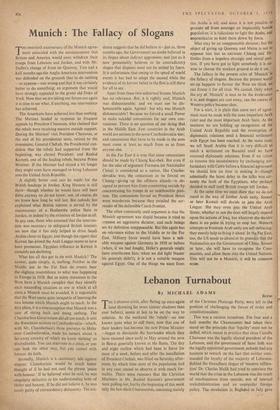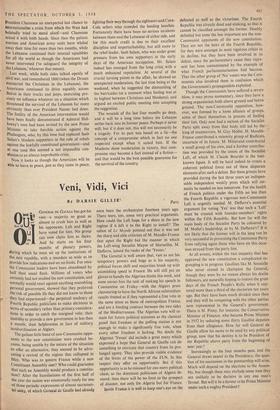Lebanon Turnabout
By MICHAEL ADAMS THE Lebanese crisis, after flaring up once again (and throwing far more sinister shadows than ever before), seems at last to be on the way to solution. At the weekend the 'rebels'—no one knows quite what to call them, now that one of their leaders has become the new Prime Minister —began to dismantle the barricades which they have manned since early in May around the area in Beirut generally known as the Basta. The day and night curfew which had been in force for most of a week, before and after the installation of President Chehab, was lifted on Saturday after- noon, by which time most of the population had in any case ceased to observe it with much for- mality. There were rumours that the Christian Ministers in Mr. Rashid Karami's government were pulling out, but by the beginning of this week only the last-ditch Chamounists, consisting mainly Beirut of the Christian Phalange Party, were left in the position of challenging the forces of order and constitutionalism.
This was a curious turnabout. For four and a half months the Chamounists had taken their stand on the principle that 'legality' must not be defied, which meant in practice that since Camille Chamoun was the legally elected president of the Lebanon, and the government of Sami Solh was the legally appointed government, nobody had any business to remark on the fact that neither com- manded the loyalty of the majority of Lebanese. Behind the threadbare slogan of 'massive infiltra- tion' Dr. Charles Malik had tried to convince the world that the crisis in the Lebanon was the result of machinations from outside, not of internal maladministration and an unpopular foreign policy. The revolution in Baghdad in July gave President Chamoun an unexpected last chance to Internationalise a crisis from which the West had belatedly tried to stand aloof—and Chamoun seized it with both hands. Since then the patient marines and American army units have whiled away their time for more than two months, while the Lebanese continued their internal squabbles for all the world as though the Americans had never intervened (`to safeguard the integrity of the Lebanon,' whatever that means). Last week, while both sides talked openly of civil war, and remembered 1860 (when the Druses massacred the Christians in the Lebanon), the Americans continued to drive equably across Beirut in their trucks and jeeps, exercising pre- cisely no influence whatever on a situation which threatened the survival of the Lebanon far more obviously than ever President Nasser had done. The futility of the American intervention would have been finally demonstrated if Admiral Hol- loway's men had been invited by the new Prime Minister to take forcible action against the Phalangists, who, by this time had replaced Saeb Salam's Moslem supporters in the role of rebels against the lawfully constituted government—and at one time this seemed a not impossible con- clusion to an always improbable crisis.
Now it looks as though the Americans will be able to leave in peace, just as they came in peace, fighting their way through the sightseers and Coca- Cola sellers who crowded the landing beaches. Fortunately there have been no serious incidents between them and the Lebanese of either side, and for this much credit is due to their excellent discipline and imperturbability, but still more to the rebel leader, Saeb Salam, who was under great pressure from his own supporters in the early days of the American occupation. Mr. Salam indeed has emerged from the long crisis with a much enhanced reputation. At several of the crucial turning points in the affair, he showed an unexpected moderation, the last time being at the weekend, when he suggested the dismantling of the barricades (at a moment when feeling was at its highest between Christians and Moslems), and argued an excited public meeting into accepting the suggestion.
The wounds of the last four months go deep, and it will be a long time before the Lebanon settles back into its former peace. Perhaps it never will; but if it does not, this will not necessarily be a tragedy. For its past was based on a lie—the concept of a compromise which in fact no one respected except when it suited him. If the Moslems show moderation in victory, that com- promise may become a fact instead of a fiction— and that would be the best possible guarantee for the survival of the country.



















































 Previous page
Previous page